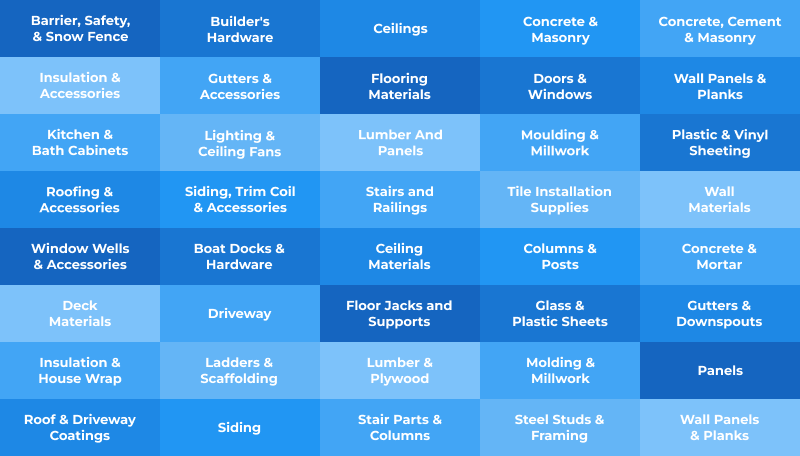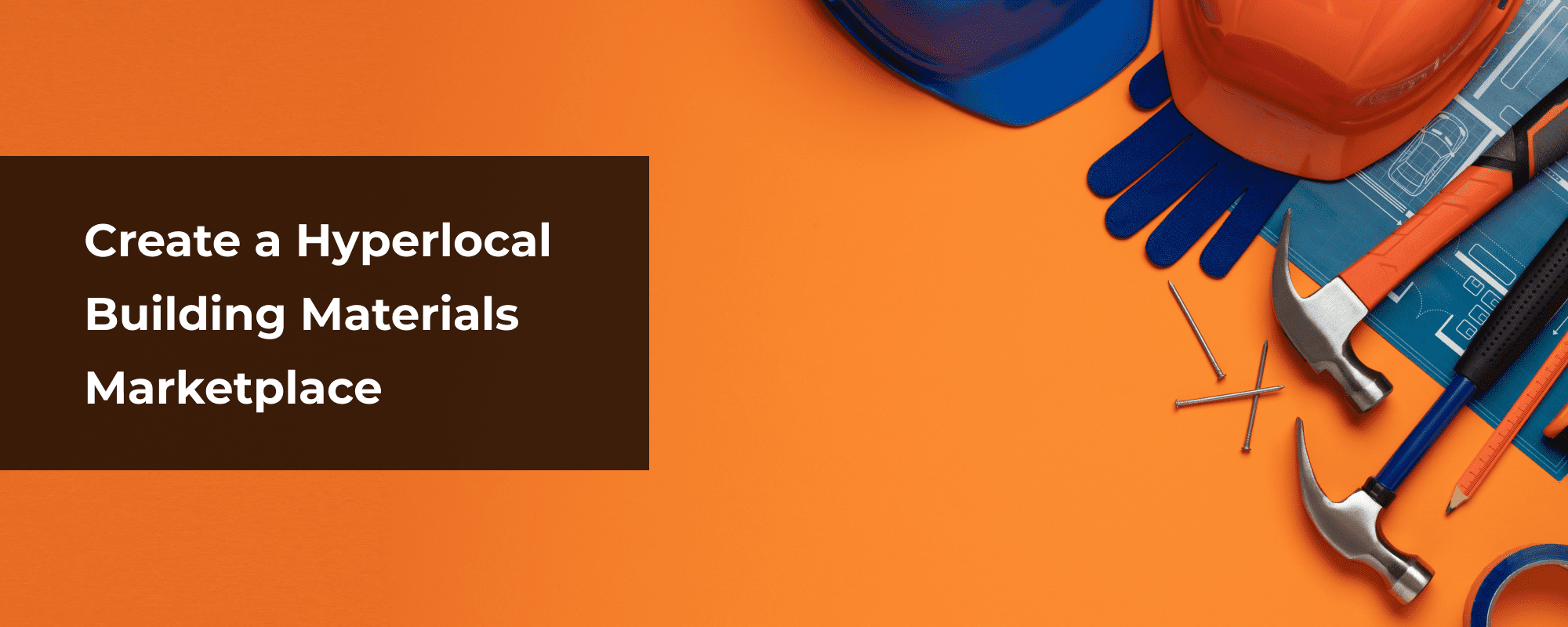The building materials industry has consistently proven to be an economically viable business option for entrepreneurs. With a global market share of a whopping $1.7 trillion in 2024, the industry has exhibited immense potential in all geographical regions. To begin with, we can take the example of the North American region, which is flourishing with the latest recorded market share of $319 billion, followed by Europe with $210 billion.
Furthermore, the industry is estimated to expand by another $159 billion in the next 5 years, indicating the long-term value of timely investing in a building materials startup. In the digitally-abled era of today where technology is redefining traditional business models, launching a hyperlocal building materials marketplace emerges to be a lucrative venture.
Not only is the hyperlocal marketplace model asset-light, which means it does not require you to own any inventory, but it also helps you grow the entire hyperlocal market as a whole. Let’s take a closer look at everything you require to launch your own multi-vendor building materials marketplace, including its primary benefits, top players, business model, software technology, and more.
Table of contents
Benefits of Launching a Hyperlocal Building Materials Marketplace
Online building materials marketplaces bring efficiency of scale with multiple vendors and a widespread product catalog. Due to this, they are able to provide the following benefits:
- Provide customers with quick access to a diverse range of building materials and supplies
- Display product availability at multiple local stores
- Are highly reliable in case of providing emergency substitutes, for example in case of shortage and wastage of materials
- Provide customers with multiple discounts and promotional offers
- Help local vendors increase online presence
- Are more transparent and reliable in terms of invoicing, returns, and accountability
Leading Building Material Businesses in the Digital Era
The building materials industry is fragmented into various players. When analyzed on the basis of their digital capabilities, the following are the industry’s leading players:
Home Depot
Home Depot is the world’s largest home improvement retailer with a wide range of building materials and supplies. It operates via both online and offline channels and has local stores all across the US. In terms of hyperlocal operations, Home Depot provides same-day delivery and also has a returns policy.
Estimated Revenue: $153.7 billion
Value Proposition: Same-day delivery, next-day delivery, both self-pick-up and delivery options, return options
Lowe’s
Lowe’s is another digital building material and supplies provider in the US. With over 2000 local stores, it provides same-day delivery services in all 50 states. Lowe’s product catalog ranges from home accessories, power tools, and HVAC to lawn & garden supplies, bathroom supplies, and flooring.
Estimated Revenue: $86.3 billion
Value Proposition: Same-day delivery, bulk order discounts, return options, buy now pay later, credit programs
Menards
Menards is a big player in the building materials industry with over 300 stores in 15 states of the US. It also provides hyperlocal building materials delivery and has a wide catalog of hardware tools, paint supplies, garden equipment, bath fittings, plumbing, and flooring products.
Estimated Revenue: $13.4 billion
Value Proposition: Same-day delivery, credit programs, self-pick-up, and delivery options
Materials Market
As the name suggests, Materials Market is a complete marketplace for building materials suppliers. It helps them sell their products to thousands of customers and expand business operations. The product catalog of Materials Market is also very wide as it sources its products from an array of suppliers.
Estimated Revenue: NA
Value Proposition: Sources building materials from multiple suppliers, helps local businesses expand business operations, bulk deals and discounts
AMAST
In comparison to Home Depot and Lowe’s, AMAST is a relatively newer player that provides online access to over 200,000 building materials and products. With multiple vendors, AMAST is an online building materials marketplace that specializes in B2B sourcing operations.
Estimated Revenue: $4.9 million
Value Proposition: Community of over 400 vendors, provides custom price quotations, provides vendor name in listings
Launch a Building Materials Marketplace like the Aforementioned Businesses
Exemplary Workflow of a Hyperlocal Building Materials Marketplace
Usually, four user types are involved in online building materials marketplace operations. These user types are:
- The Admin: The marketplace owner and their subordinates who oversee and manage the overall platform. The admin is not necessarily required to own any of the listed products.
- Vendors: Local building material suppliers and manufacturers wanting to sell their products on the marketplace. Vendors also have to maintain inventory and timely dispatch orders.
- Delivery Staff: The on-field delivery personnel that take care of the delivery.
- Customers: The hyperlocal target audience, which can be local contractors, homeowners, private offices, and concierges.
These four user types interact on the marketplace platform in the following manner:
- The admin configures the marketplace including webpages, logos, payment gateways, commission rate, withdrawal settings, and the master catalog.
- Multiple vendors sign up on the marketplace and list their products
- Customers select their preferred products, delivery slots, and complete the checkout process.
- The admin commission is deducted from the order payment and the remaining amount is stored in the vendor’s eWallet.
- Vendors fulfill the order as per the selected order fulfillment method, ie., delivery or self-pick-up.– In case of delivery, the admin or seller assigns the order to a delivery staff. Alternatively, the system can also broadcast delivery to all nearby delivery personnel.
- Upon reaching the minimum withdrawal threshold amount, vendors can transfer their earnings from their eWallets to their bank accounts.
Necessary Features Required in Your Hyperlocal Building Materials Marketplace
Based on the aforementioned business workflow, your online building materials marketplace requires the following features:
- Delivery Time Slots: Ensure convenience to your customers by providing multiple delivery time slots.
- Self-pick-up Module: Allow customers to pick up building materials as per urgency or from nearby stores. Alternatively, this option can also be used as BOPIS payment method.
- Single Item Cancellation: Allow customers to cancel single items from already placed orders.
- Order Adjustment: Ensure a higher customer satisfaction rate by providing substitute products in case of out-of-stock or unavailable items.
- Order Management: Track orders in real-time including delivery status, vendor details, customer details, etc. You can also edit the status updates of in-progress orders.
- Subscription Packages for Vendors: Provide vendors with a satisfying selling experience by creating premium subscription packages.
- Vendor Catalog: Allow vendors to import, create, or request their own custom product catalog.
- Vendor Management: Get comprehensive vendor management options including registration request approval, sales history, order history, product catalog access, and more.
- Commission Settings: Set and charge your own commission rate and withdrawal settings, such as minimum withdrawal threshold and minimum withdrawal interval.
- Delivery Management: Manage delivery staff profiles, set delivery charges, and assign or broadcast orders.
Mobile Apps for Customers and Delivery Staff
Along with these features, your entire technology infrastructure will also require separate mobile apps for customers and delivery staff:
- Customers Mobile App: Through the app, customers can conveniently browse all building materials and place orders. They can also access search filters, view order history, view rewards, and even track in-transit orders. For added convenience, they can create and access wishlists and save delivery addresses and payment details for quick checkouts.
- Delivery Staff Mobile App: Via the mobile app, delivery staff can easily view all broadcasted and assigned orders. They can select their delivery radius, access GPS navigation, and keep a record of all earnings and deliveries.
Get Cost Estimations for Your Building Materials Marketplace with Mobile Apps
Steps to Launch Your Online Building Materials Marketplace
Launching a new startup consumes substantial time and effort. It is highly recommended to invest those efforts in the right direction. For more efficiency, you should create a launch strategy for your building materials marketplace. To further help you out, we have outlined the major steps required to launch your hyperlocal business.
Step 1: Conduct Market Research
It is highly possible that statistical data for your target hyperlocal market may not be available. In such a situation, instead of statistical data, you rely on consumer surveys and feedback. Multiply the number of potential customers in the total number of respondents by the amount of money they are willing to spend on your online building marketplace. By scaling up this data to the target region’s actual population, you can estimate the market size. Additionally, focus your research on the pricing mechanics, key competitors, and consumer behavior.
Step 2: Prepare a Revenue Generation Model
For earning revenue, you need to solidify a working revenue generation model that you can easily set up on your online store. Your revenue generation model should focus on maximizing profit generation and diversifying the income streams. Some revenue streams that you can include in your hyperlocal marketplace are:
- Sales Commission: Flat rate or percentage commission on every transaction that takes place on your marketplace.
- Subscription Packages: To provide a superior experience to certain vendors, you can create and sell custom subscription packages with different offerings, such as lower commission rates and free featured listings.
- Featured Listings: Similar to subscription packages, you can sell featured listing spaces to your vendors. These listings appear in the most viewed sections of the marketplace, such as the homepage banner, at the top of search results, etc.
- Display Ads: You can also charge third-party businesses to display their ads on your marketplace platform
- Delivery Commission: You can levy your commission charges on paid deliveries.
Step 3: Choosing the Development Approach
There are two development approaches to develop your hyperlocal marketplace.
- Using a Readymade Software:
Readymade software are tried and tested business solutions that are developed after thorough research of market scenarios and various use cases. Due to this, they come with all essential features to facilitate hyperlocal operations right out of the box. To provide a superior user experience, readymade hyperlocal delivery solutions also have shorter workflows. Some benefits of using a readymade solution to develop your building materials marketplace are:
- Coding or programming knowledge is not required
- Shorter time-to-market
- Come with all essential features right out of the box
- Already tried and tested
- Highly cost-effective
- Bespoke Software Development
In the bespoke development approach, you need to develop the marketplace from scratch. Either you can write the source code yourself or hire a software developer. While bespoke software development is a feasible approach, it lacks the benefits provided by readymade software. For example, the development time frame in bespoke development can range from several months to years and you will also need to pay hourly development costs to the development firm. Some benefits of using bespoke software development are:
- Can be used if you want your marketplace to be developed on a very specific technology, for example, Laravel and Koka
- Can help you follow any business model
| Using Readymade Software |
Bespoke Software Development |
Comes with all essential
features in-built |
Requires everything to be
developed from scratch |
Already tried and tested
for market scenarios |
Not tested for market scenarios
|
| Shorter time-to-market |
Longer development
and deployment timeframe |
| More cost-effective |
Highly costly because of
hourly development payment |
| Has predefined workflows |
Workflows can be designed
as per business requirements
|
Step 4: Market the Platform
After developing and configuring the marketplace, you can start your hyperlocal building materials business operations. Prioritize local SEO to attract a hyperlocal audience and also connect with local contractors, engineers, plumbers, and other service professionals. To build your product catalog, you will need to onboard several vendors. There are multiple ways to do so including introducing lucrative offers, building a personal network, email marketing, paid campaigning, and more. For more assistance in attracting vendors to your hyperlocal building materials marketplace, check out this blog.
Lastly, you also need a wide range of building materials to meet the diverse requirements of customers. Some building materials that you can sell on your marketplace are:
Building Materials:-

How Growcer Can Help
Growcer is a readymade hyperlocal delivery solution that supports numerous marketplace operations including building materials. It has been carefully developed after years of research to help you with daily hyperlocal business use cases. Perfected with native Android and iOS mobile apps along with different admin, vendor, customer, and front-end interfaces, Growcer is fully equipped to power robust marketplaces.
To further streamline your business, Growcer automates several operations such as inventory, invoicing, returns, cancellations, commissions, payments, taxes, discounts, promotions, user management, analytics, and even shares real-time order status with customers. With automated workflows, Growcer is also able to reduce your overall operational costs.
Lastly, marketplaces built with Growcer are completely white-label and fully scalable. Meaning, that not only you can rebrand Growcer and promote your marketplace under your own brand name but also provide your vendors with unlimited listings and transactions for limitless growth.
Reasons to select Growcer to build your online building material marketplace:
- No coding required to launch your marketplace
- Complete white-label software that you can rebrand
- No monthly or annually recurring charges
- Free 12 months of technical support
- Native Android and iOS mobile apps
- Fully scalable and customizable
- Comes with multilingual and multi-currency support
- Complete source code ownership
- Thorough documentation and tutorials for easy onboarding
Book a One-on-One Personalized Demo of Growcer
ShortA: A Building Materials Marketplace Built with Growcer
ShortA is an online building materials marketplace with operations in New Zealand and the United Kingdom. With over 7000 delivery partners, ShortA delivers a wide range of construction supplies, including power tools, plumbing tools, electrical supplies, etc. With the help of Growcer, ShortA is able to simplify operations between vendors, customers, and delivery partners. Moreover, it also uses mobile apps to deliver superior service to contractors and homeowners.
Conclusion
The increasing convenience of online shopping apps is revolutionizing diverse industries. However, the revolution is still much awaited at the hyperlocal level in many states and cities. In the building materials industry, you can take the initiative and gain the first-mover advantage by launching your own hyperlocal building materials marketplace. To launch a reliable marketplace, you will need to focus on several factors such as market research, consumer behavior, software technology, and onboarding vendors. After launching your marketplace, build a strong supplier network and focus on local SEO to grow your business.


